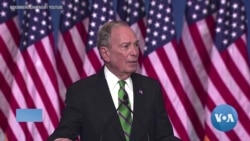Former New York Mayor Mike Bloomberg has dropped out of the race to become the Democratic Party's presidential nominee, after a weak showing in the 14 states that held primaries Tuesday.
Former Vice President Joe Biden won nine states, including the delegate-rich state of Texas. Vermont Senator Bernie Sanders took the state with the most delegates, California, as well as Colorado, Utah and his home state of Vermont. Bloomberg won American Samoa, the U.S. territory, gaining five of its six delegates, while picking up three more delegates in Colorado and one in Arkansas.
"Three months ago, I entered the race for President to defeat Donald Trump. Today, I am leaving the race for the same reason: to defeat Donald Trump – because it is clear to me that staying in would make achieving that goal more difficult," Bloomberg said in a statment Wednesday. "I've always believed that defeating Donald Trump starts with uniting behind the candidate with the best shot to do it. After yesterday's vote, it is clear that candidate is my friend and a great American, Joe Biden."
In the past two months, Bloomberg's path to the Democratic nomination had been the one to watch. A former Republican and independent, Bloomberg's message had been that he was the one who could beat Trump in the general election, appealing to moderate and conservative Democrats.
Entering the race late, Bloomberg skipped the first four states of Iowa, New Hampshire, Nevada and South Carolina and going straight to Super Tuesday, with 1,357 delegates at stake. He reportedly spent $600 million of his vast fortune on TV and social media campaign ads and built a staff seemingly overnight on the ground in each state. He tapped into local mayors and community groups for his support.
But it wasn’t enough. Having spent so much money and with more to spend, Bloomberg’s campaign could have kept going to the Democratic convention in Milwaukee, Wis. this summer. Pundits will discuss for years what the Bloomberg bid was all about. One takeaway may be the power, and limits, of money.
“A lot of the times in the United States, we look at our elections and say, ‘oh my god, there’s so much money and it’s absolutely horrible.’ And the truth is that the obscene amount of money in U.S. politics is corrosive, if not corrupting,” said Donnie Fowler, an adjunct professor at University of San Francisco and a veteran of eight Democratic presidential campaigns.
“However, Mike Bloomberg like many many before him has proven that just because you have the most money, doesn’t mean you are going to be the winner,” Fowler said. “Now you can’t run a campaign in the United States with no money. But there are more examples of candidates with the most money, especially self-funding, very wealthy candidates who lose than candidates with the most money who win. That’s an important lesson to take away from Mike Bloomberg. Money is not everything.”
Like a lot of people, Soham Bhatia, who works at an educational nonprofit organization in Oakland, had divided loyalties. Wearing a "CA for Mike" shirt in support of Bloomberg and a "Team Joe" sticker for Biden, Bhatia went to a cafe in Oakland on Tuesday to see Biden, who was making a campaign appearance.
"I voted for Mike Bloomberg," he said. "I got all my friends to vote for Mike Bloomberg. We voted early. It looked like Biden would not get his stuff together. And then he did. Now it's time to unite behind Joe Biden."
Bhatia still supports Bloomberg, though, hoping the former New York mayor plays a role in the Democratic convention in Milwaukee this summer.
"He gambled, he did something very interesting, and he should be commended for that," he said.






